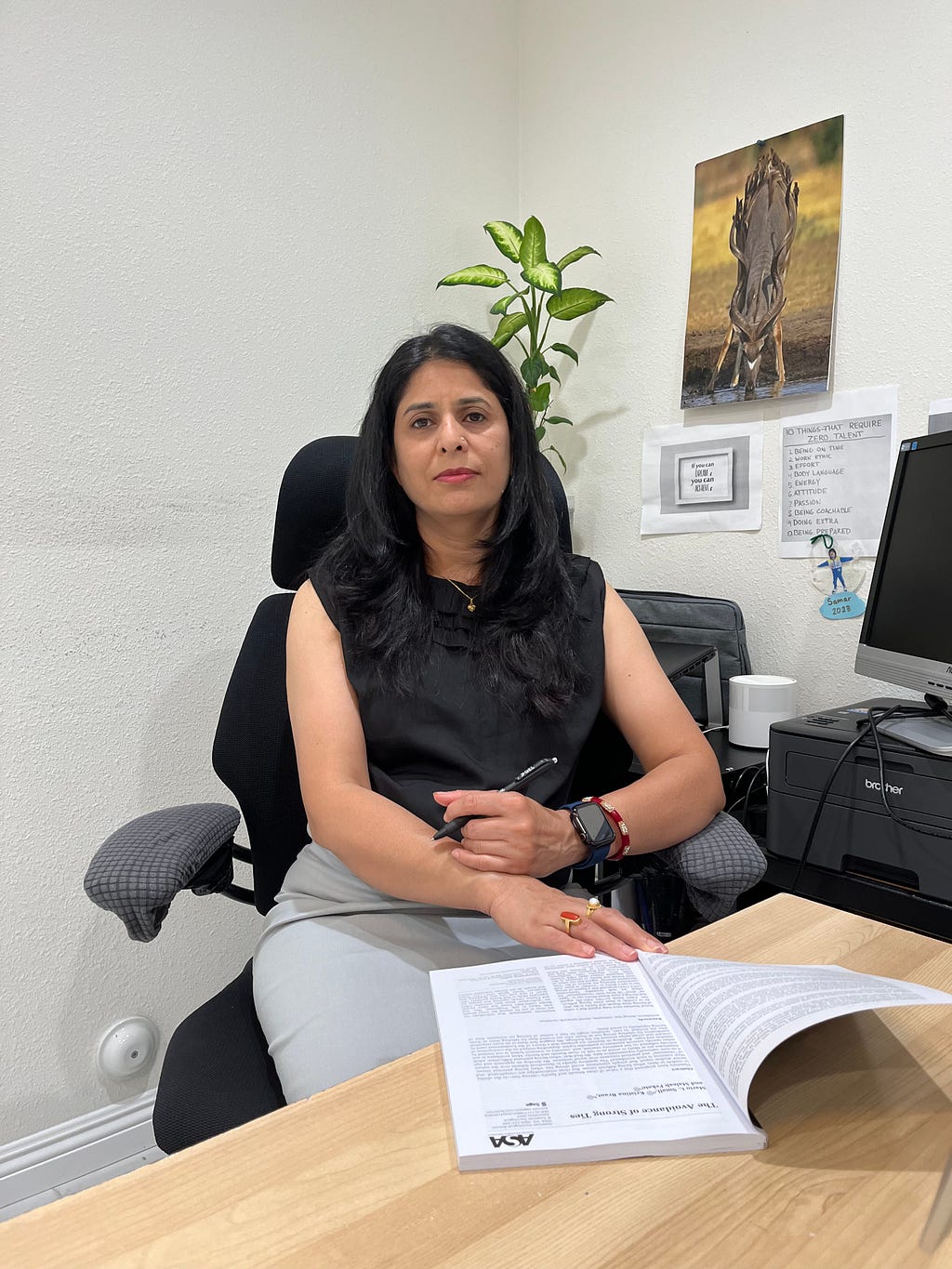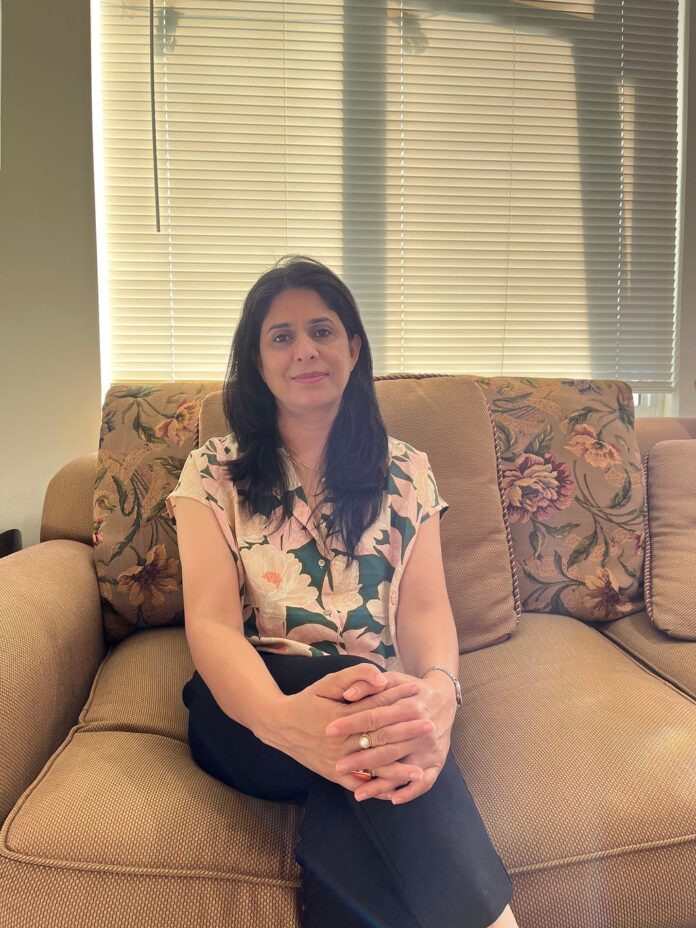Sanju Purohit Of Akamai University: 5 Things We Must Do To Inspire The Next Generation About Sustainability And The Environment
An Interview With Martita Mestey
Encourage Critical Thinking and Problem-Solving: Challenge children to think about environmental issues and develop their own solutions. Engaging in projects like designing a rainwater harvesting system will teach them to apply theoretical knowledge practically.
As a part of my series about what we must do to inspire the next generation about sustainability and the environment, I had the pleasure of interviewing Dr. Sanju Purohit.
Dr. Sanju Purohit is an Associate Professor (Volunteer) at Akamai University, USA, specializing in Environmental/Ecological Studies and Sustainability. She earned her Ph.D. in Geography and has since dedicated her career to researching environmental health hazards, sustainable resource management, and the socio-economic impacts of climate change. Dr. Purohit is a recognized Fellow of The Royal Geographical Society, UK, and has made significant contributions to academic literature and community-based environmental projects.
Thank you so much for doing this with us! Our readers would love to “get to know you” a bit more. Can you tell us a bit about how you grew up?
I was raised in the vibrant yet challenging environment of Rajasthan, India, where the desert landscape shaped much of our daily lives. Growing up in a community grappling with water scarcity and land degradation, I developed an early awareness of environmental issues and their profound effects on people’s livelihoods. These formative experiences ignited my passion for geography and sustainability, guiding me towards a career dedicated to understanding and solving environmental challenges.
Was there an “aha moment” or a specific trigger that made you decide you wanted to become a scientist or environmental leader? Can you share that story with us?
Certainly. One memorable moment was during a severe drought that struck our region when I was a teenager. Witnessing my family’s and neighbors’ struggles to secure water and sustain their livelihoods left a lasting impression on me. This experience was a catalyst, compelling me to pursue environmental studies with the aim of developing sustainable solutions to such crises.
Is there a lesson you can take out of your own story that can exemplify what can inspire a young person to become an environmental leader?
A key lesson from my journey is the transformative power of personal experiences in shaping one’s purpose. Facing environmental hardships firsthand taught me empathy, resilience, and the importance of proactive problem-solving. I believe young people can draw inspiration from their unique experiences, using them as a foundation to drive change and lead initiatives that address pressing environmental issues.
Can you tell our readers about the initiatives that you or your company are taking to address climate change or sustainability? Can you give an example for each?
At Akamai University, we are committed to fostering sustainability through both education and actionable projects. One initiative is our Urban Sustainability Program, which educates students and community members on sustainable urban planning and green infrastructure. Another example is the Climate Action Research Group, which conducts interdisciplinary research on climate mitigation and adaptation strategies, collaborating with international partners to implement scalable solutions.
Can you share 3 lifestyle tweaks that the general public can do to be more sustainable or help address the climate change challenge?
- Mindful Consumption: Choosing products with minimal packaging, supporting eco-friendly brands, and reducing overall consumption can significantly decrease environmental impact.
- Energy Efficiency at Home: Using programmable thermostats, insulating homes properly, and utilizing natural lighting can reduce energy usage and lower carbon footprints.
- Promote Biodiversity: Planting native species in gardens, creating habitats for local wildlife, and avoiding the use of pesticides contribute to maintaining ecological balance and supporting biodiversity.

In your opinion, what are 5 things parents should do to inspire the next generation to become engaged in sustainability and the environmental movement? Please give a story or an example for each.
- Cultivate Curiosity About Nature: Encourage children to explore the outdoors and ask questions about the environment. I recall how my parents took me bird-watching, which sparked my interest in ecological systems.
- Integrate Sustainability into Daily Life: Incorporate sustainable practices at home, such as recycling and composting, to make these habits second nature. My father played a significant role in teaching me important values, like not wasting anything, during my childhood. We were taught to only fill our glass with as much water as we could finish and to take only the amount of food we could eat. We can pass these lessons on to our children by using real-life examples from around the world.
- Support Educational Opportunities: Provide resources like books, documentaries, and educational programs focused on the environment. Reading books on geography and environmental science with my parents deepened my understanding and passion for the subject.
- Engage in Community Projects: Participate in local environmental initiatives together, such as tree planting or clean-up drives. Volunteering in community clean-ups with my family instilled a sense of responsibility and collective action.
- Encourage Critical Thinking and Problem-Solving: Challenge children to think about environmental issues and develop their own solutions. Engaging in projects like designing a rainwater harvesting system will teach them to apply theoretical knowledge practically.
How would you articulate how a business can become more profitable by being more sustainable and more environmentally conscious? Can you share a story or example?
Adopting sustainable practices can enhance a business’s profitability by reducing operational costs, improving efficiency, and appealing to environmentally conscious consumers. For example, I led an awareness campaign about generating electricity with solar energy at an NGO. Initially, people were concerned about the installation costs, but when we presented the long-term benefits, they were convinced to install solar units at their homes and workplaces. Commitment to sustainability attract a loyal customer base, leading to increased sales and a stronger market position.
None of us are able to achieve success without some help along the way. Is there a particular person who you are grateful towards who helped get you to where you are? Can you share a story about that?
I am profoundly grateful to Dr. Ahmed Ali, my Ph.D. advisor, whose mentorship was pivotal in my academic and professional development. Dr. Ali not only provided invaluable guidance during my research but also encouraged me to pursue innovative approaches in my work. His unwavering support and belief in my potential empowered me to overcome challenges and achieve my goals.
You are a person of great influence and doing some great things for the world! If you could inspire a movement that would bring the greatest amount of good to the greatest number of people, what would that be?
I would inspire a Global Education for Sustainability Movement, to protect the environment. I want to raise awareness, that we all need to play our part in saving the Earth. Every small step will contribute to positive results. The implementation should begin in each person’s home; only then can we achieve our goal. By educating future generations about environmental stewardship, sustainable practices, and the importance of conserving natural resources, we can cultivate a culture of responsibility and innovation that addresses global challenges effectively.
Do you have a favorite life lesson quote? Can you tell us how that was relevant to you in your own life?
Yes, one of my favorite quotes is, “The greatest threat to our planet is the belief that someone else will save it,” attributed to Robert Swan. This quote resonates deeply with me as it underscores the collective responsibility in addressing environmental issues. Throughout my career, I have embraced this ethos by actively engaging in research, education, and community initiatives aimed at fostering sustainability.
What is the best way for people to continue to follow your work online?
Individuals interested in following my work can connect with me through ResearchGate (https://www.researchgate.net/profile/Sanju-Purohit), Google Scholar (https://scholar.google.com/citations?user=V9zlPl4AAAAJ&hl=en), and my ORCID profile (https://orcid.org/0009-0004-8951-7520). These platforms provide comprehensive access to my latest research, publications, and academic contributions, allowing followers to stay informed about my work and its impact.
This was so inspiring. Thank you so much for joining us!
Sanju Purohit Of Akamai University: 5 Things We Must Do To Inspire The Next Generation About… was originally published in Authority Magazine on Medium, where people are continuing the conversation by highlighting and responding to this story.


